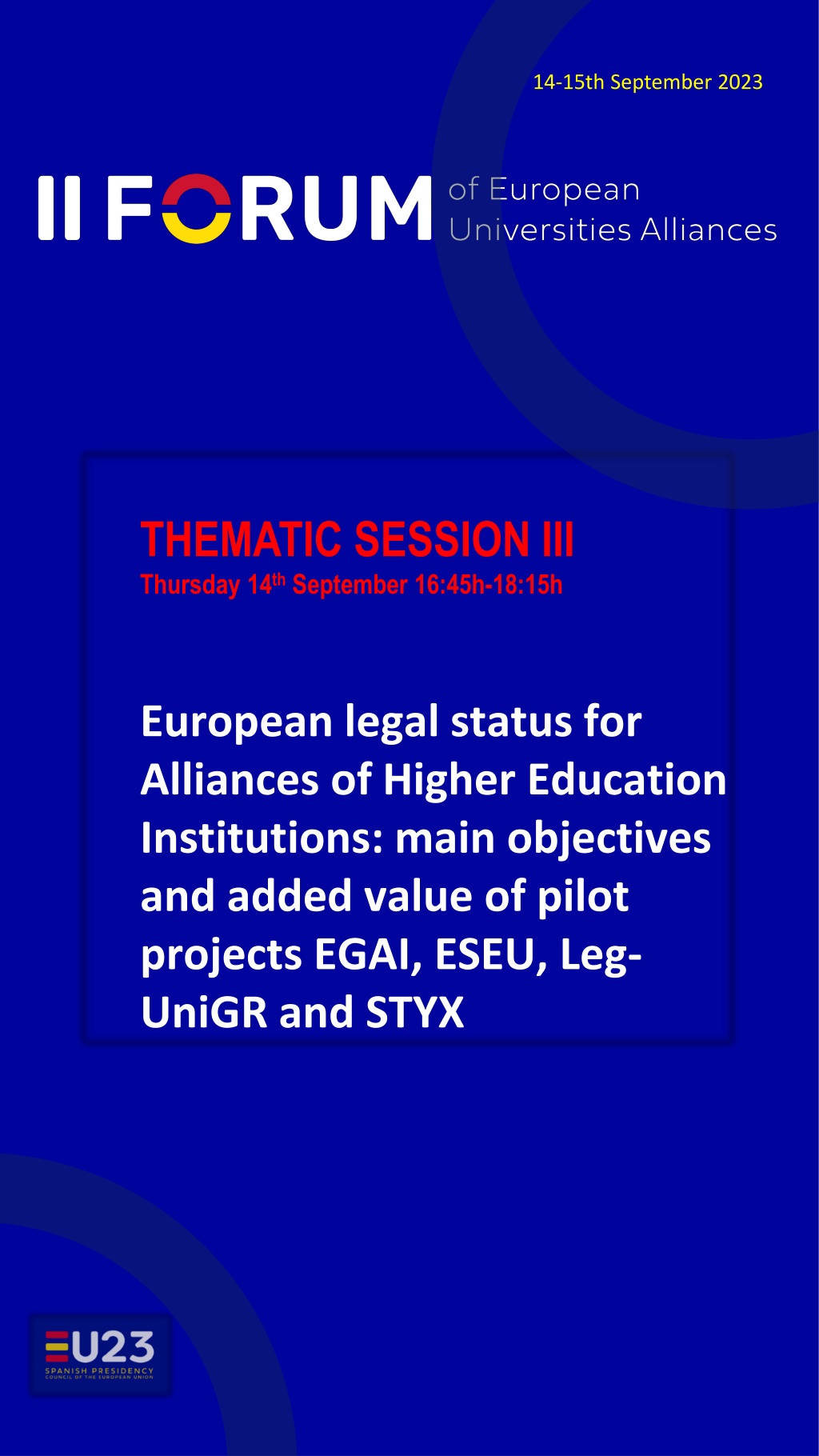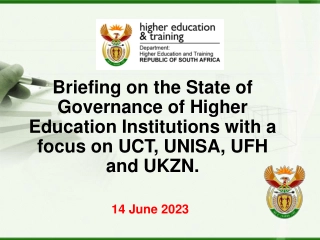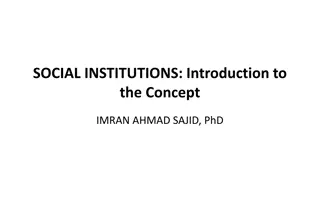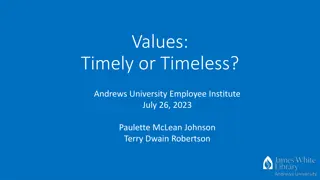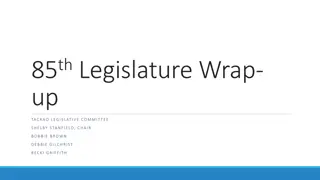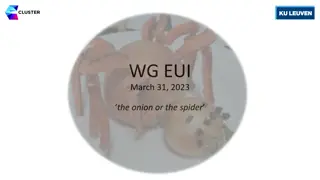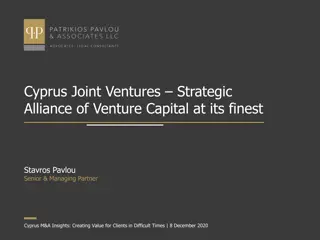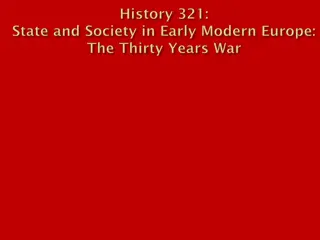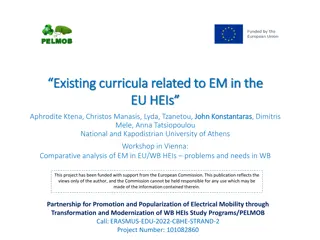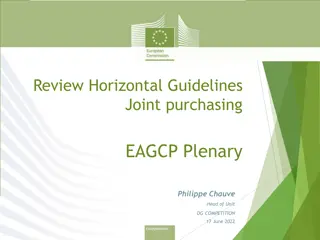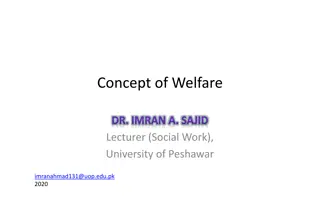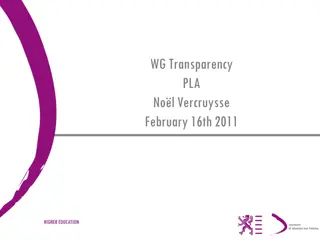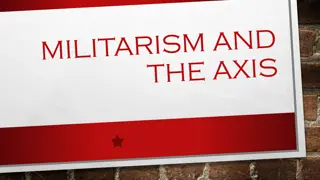European Legal Status for Alliances of Higher Education Institutions
European universities are exploring the necessity and benefits of establishing a legal entity for alliances of higher education institutions. Joint management of resources, simplified accreditation, quality assurance, and access to international networks are among the key objectives. The European Commission is consulting stakeholders and Member States to assess the feasibility of a legal status for these alliances.
Download Presentation

Please find below an Image/Link to download the presentation.
The content on the website is provided AS IS for your information and personal use only. It may not be sold, licensed, or shared on other websites without obtaining consent from the author. Download presentation by click this link. If you encounter any issues during the download, it is possible that the publisher has removed the file from their server.
E N D
Presentation Transcript
14-15th September 2023 THEMATIC SESSION III Thursday 14th September 16:45h-18:15h European legal status for Alliances of Higher Education Institutions: main objectives and added value of pilot projects EGAI, ESEU, Leg- UniGR and STYX
INTRODUCTION European Universities quickly faced the need of a legal entity. They started sharing the interests and the reasons why the alliances need (or not) a legal entity and decided to explore it together in FOR-EU1 and FOR-EU2 and in close contact with the European Commission. The main reasons identified were: Joint resources management: o Joint human resources: joint staff recruitment, management and secondment o Joint data management and ethics o Joint physical and online infrastructure management o Joint financial resources Joint procurement of goods and services Joint applications for EU and national funding Joint reception of other funds, such as private, national and regional funding sources Joint student recruitment and management Simplified accreditation of joint programmes, leading to joint degrees (~European degrees) Simplified internal and external quality assurance Joint access to international networks Sustainability of the cooperation and joint identity The alliances also explored together existing cases of existing national and European formulas such as national non for profit associations, European Grouping for Territorial Cooperation (EGTC) and a European Research Infrastructure Consortium (ERIC), European Economic Interest Grouping (EEIG) or Institutional Partnerships. In the meantime, the European Commission started the analysis of the necessity and feasibility of a legal status for alliances of universities, as well as possible options and is consulting with stakeholders and Member States.
INTRODUCTION Almost four years have passed since the start of the first European Universities and the landscape has evolved. On the one hand, several alliances from the first and the second call have created legal entities for instrumental purposes among other reasons. However, many of them have been established at the national level, except for one or two that chose the international non-profit association (Association Internationale Sans But Lucratif - AISBL). In addition, the European Council has set some recommendations COUNCIL RECOMMENDATION of 5 April 2022 on building bridges for effective European higher education cooperation: Background The Commission Communication on achieving the European Education Area by 2025(1) calls for seamless and ambitious transnational cooperation, for a facilitated delivery of joint degrees, and for the feasibility of a legal statute for alliances such as the European Universities to be explored. Higher education alliances could benefit, on a voluntary basis, from institutionalised cooperation instruments, such as a possible legal status for alliances of higher education institutions, that enable them to share, where appropriate, common financial, human, digital and physical resources, and services, to operate virtual inter-university campuses and interoperable platforms for joint digital or blended activities . And recommends to Member States to: Open up the opportunity for higher education institutions to explore, in a co-creation process, the necessity, benefits, risks and feasibility of setting up institutionalised cooperation instruments, such as a possible legal status for alliances of higher education institutions, for example EuropeanUniversities , with the objective of facilitating deeper cooperation by sharing human, technical, data, education, research and innovation capacities, where appropriate. Allow them to experiment with the diverse possibilities of deeper cooperation as well as to test, on a voluntary basis, existing European instruments, such as the European grouping of territorial cooperation (EGTC) for the European Economic Interest Grouping (EEIG) .
PURPOSE OF THE SESSION Through an Erasmus+ policy experimentation call, the European Commission funds 4 pilot projects that started in spring 2023 and that will allow alliances of higher education institutions (not only the selected under the European Universities initiative), to test institutionalised EU cooperation instruments, such as a possible European legal status for these alliances. The aim of this legal status is to give university alliances, on a voluntary basis, the latitude to act together, make common strategic decisions, experiment joint recruitment, design joint curricula or pool resources and human, technical, data, education, research and innovation capacities. The 4 pilot projects that have been selected under the Erasmus+ call on the legal status topic are: ESEU, A European Status for ECIU University Leg-UniGR, Blueprint for a legal entity for cross-border university alliances STYX, EUt+ Status and structure experience EGAI, Unita as a model for institutionalized University cooperation: from the European Grouping of economic interest to the European grouping of academic interest The four of them represent different approaches to the topic and different combination of countries involved. During the session, the participants will be able to: Know more about the expected outcomes and impact of the results of this pilot experience from the point of view of the alliances and from the European Commission. Understand why each Alliance selected the approach and the legal entities Learn which are the main challenges on the implementation Discuss with the audience additional experiences and explore future actions that can be taken.
DISCUSSION TOPICS There are several opinions amongst the Alliances about the different needs for a legal status, and about which European legal status entity would suit better the purpose and the mission of the alliance. During the session the panelists will share with the audience why the alliances decided to establish a concrete type of legal entity and if they consider that this instrument is adequate for the purposes of the alliance. One of the objectives of the pilots is tot test if any (or more than one) of the existing European legal entity types is adequate for the purpose of the Alliances, or can be an evolution of one of the existing? To create a brand new European legal entity type will not be an easy nor quick task. In the selection and implementation of their projects, the alliances are investigating which characteristics of the type of entity they selected are more suitable for their missions. Is there a wish list about the characteristics of a future legal entity for European Universities? To establish and manage a European legal entity has significant challenges. The panelists will share what challenges they are facing in the implementation and how they are solving them or expect to solve them in the future. The European Commission has discussed the matter in several meetings with Member States representatives and the Council has made recommendations explicitly on the question to explore, in a cocreation process, the necessity, benefits, risks and feasibility of setting up institutionalised cooperation instruments, such as a possible legal status for alliances of higher education institutions. The panellists will share how this is perceived and supported by the Member States of the partner Universities, and which is the expected role or collaboration from them.
SESSION OUTCOMES The pilot initiative is supporting the European Strategy for Universities, in one of the key elements: to help European Universities and other Consortia to deepen transnational cooperation, to maximise the value of cooperation of the higher education institutions for students, staff and society through testing the existing European tools, check if they can accommodate the needs of the alliances and identify what is missing, what are the challenges and blocking factors and at what level (European, national, regional) are they. The common request from the European Commission, the Member States and the European Universities and other possible consortia is to clearly define the needs that this legal status needs to serve and to facilitate the transnational cooperation among Higher Education Institutions for the benefit of the society. The pilots are addressing this question, and even if ach Alliance has its own mission and vision and the four pilots have different approaches and will produce complementary outcomes, there is a common ground on the why they need a legal entity: hiring and sharing people, mobility among universities, data management, joint education offer, such as the piloting of a joint European Degree or microcredentials, joint revenues, eligibility for public and private funding. The pilots are just in the middle of the one-year project. However, all of them seem to have arrived to the conclusion that the existing European formulas are not fully fitted for purpose and not matching all the needs of their alliance, and concrete recommendations will come at the end of the pilots.
SESSION OUTCOMES The national perspective is a key element from two angles. On the one hand, having a legal entity able to operate at a transnational level and second, operating in the context of education that is exclusive competence of the member states. Europe has experience on working together with the Member States on joint solutions and this is clearly one of the cases that needs joint efforts. At the end, a possible European legal status for the alliances needs to be a solution that allows to operate smoothly in different countries, but designed and agreed upon at the European level among the Member States. It cannot be a specific status designed depending on the constellation of countries of each alliance. The pilots until now, have collected interest and some kind of commitment in some Member States to find a way. It will depend on what the alliances want to do with the legal status. From the session and discussion, it was clear that for some the resulting legal status is expected to be recognised as a University at the national level. It was highlighted that a possible legal status for alliances could also facilitate the delivery of joint s European Degrees. The students have a clear role and participation at the local/partner level and their role and participation in a possible future legal status needs to be ensured and perceived as complementary and enriching their participation at the European level. The alliances need to work on this perspective.
PARTICIPANTS MODERATOR Meritxell Chaves, Director. CHARM-EU Alliance Meritxell Chaves is the Secretary General of European University of CHARM-EU since the start of the initiative in 2019. She has more than thirty years of experience in the higher education sector, in four universities of the Catalan university system, in different functional areas of the University, leading teams and projects in different organisational cultures . She is the chair of the FOR-EU1 subgroup Governance and legal framework, since 2020.
PARTICIPANTS PANELISTS Tine Delva, Deputy Head of Unit, Higher Education, Directorate-General for Education, Youth, Sport and Culture. European Commission. Tine Delva works as deputy Head of Unit in the higher education department of the Commission's Directorate-General for Education and Culture (DG EAC). Tine is fully involved in the European Universities initiative and the European strategy for universities. Before, Tine worked in the economic department of the Secretariat-General of the European Commission, where she was contributing to the work of the European Commission in areas such as economic governance and the EU follow-up to the UN 2030 Agenda for Sustainable Development. Before Tine entered the European Commission, she was a cabinet member of two Members of the European Parliament. Tine has an academic background in economics, complemented with European affairs. She is co-author of the book "The functioning of Europe, after Lisbon" (2010, 2015, in Dutch).
PARTICIPANTS Ms. Olga Wessels, Head of Brussels' Office. ECIU Alliance, pilot ESEU Olga Wessels is the Head of the Brussels office of the European Consortium of Innovative Universities (ECIU), the university network of ECIU University, where she contributes to setting the agenda of ECIU at the European level in both education and research policy and programme development. Amongst other topics, Wessels is responsible for analysing the possibilities for a European Status for Alliances of Higher Education Institutions, coordinating the ESEU-project. Wessels also initiated and chairs the FOR-EU network (together with Ludovic Thilly), bringing all alliance coordinators together and having different subgroups in place to connect alliance s experts on topics such as research collaboration, IT, project management and the European Degree. Furthermore, Wessels is a member of the International Advisory Board of NHL Stenden (RUN-EU alliance). Before joining ECIU, Wessels represented the Dutch knowledge field in Brussels at the Netherlands House for Education and Research and she was a board member of the Dutch National Student Union.
PARTICIPANTS Eric Tschirhart,Special Advisor to the Rector. UNIVERSEH, pilot LEG-UniGR Eric Tschirhart is Full Professor of Physiology at the University of Luxembourg, Special Advisor to the Rector, coordinator of the Erasmus+ 'UNIVERSEH European University', 'University of the Greater Region' activities and of the pilot project 'Leg-UniGR - Blueprint for a legal entity for cross-border university alliances' in Luxembourg. Professor Eric Tschirhart holds a PhD in Pharmacology and an MBA. After working in the pharmaceutical industry and in public research institutions, he joined the University of Luxembourg in 2002, where he contributed to the development of Life Sciences in Luxembourg, before holding a series of management positions at the University of Luxembourg in research, finance & administration, technology transfer, fundraising and academic organisation as Vice-President. He also has recurrent experience in the evaluation of higher education institutions. Professor Eric Tschirhart still teaches physiology in Medical and Life Sciences programmes and has supervised PhD candidates recurrently. He has more than 50 publications in peer-reviewed scientific journals in the fields of physiology, pharmacology, drug development, and space immunology.
PARTICIPANTS Mr. Timoth e Toury, General Secretary. EUt+, pilot STYX He is Secretary General of the European University of Technology, EUt+, where he initiated the original idea and vision. He has been Associate Professor (physics, non-linear and quantum optics, and nanotechnologies) at Universit de Technologie de Troyes (UTT) since 2006. He has been Director of Academic Affairs of UTT (2012 2015) and First Vice-President of Universit de Champagne (2016 2017). He graduated from cole normale sup rieure de Paris and Cachan (now ENS Paris-Saclay) where he obtained a PhD in physics in 2005. He has been a research engineer for technology transfer at the CNRS. He has more than 45 international reviewed papers, international patents, book chapters... He has been leader of 5 and involved in 8 European, national and regional research projects. He is an expert for the French Commission des titres d ing nieurs (ENAEE member), World Bank and French development agency (AFD) in university governance and higher education and pedagogy reform. He led two CBHE European projects. He is and has been a member of numerous executive boards, academic council or steering committees of higher education institutions.
PARTICIPANTS Dra. Barbara Gagliardi, Project coordinator. UNITA Alliance, pilot EGAI She is Associate Professor in Administrative Law and Vice Director for research activities of the Department of Law of the University of Turin. She is the coordinator of the EGAI project, cofounded by the EU together with the partners of the Unita alliance, to study the instruments of institutionalized partnerships for academic cooperation. She carries out research mainly in the areas of university law and academic freedom, public administrative organization, organization. She has been a visiting scholar at the Chaire Mutations du Droit Public et de l'Action Publique de Sciences Po Paris (2008-2009) and at the Center for Studies in Higher Education de la University of California - Berkeley (2019) and participated in research conducted by the Universities of Neuch tel (Switzerland), the University of Barcelona (Spain) the University of Dijon and the University of Franche- Comt (France). employment and and care health She is the author of over seventy scientific publications, including monographs, articles and book chapters, and editor-in-chief of the amministrativo' (ed. Giuffr ). legal journal "Diritto
